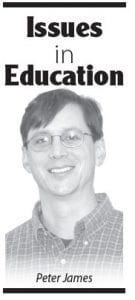Perhaps sooner than we’d like, and perhaps more dramatically, signs of change are all around us: longer periods of daylight, warmer temperatures, county road restrictions…. Spring is imminent and as much as we may have been looking forward to more of our favorite winter activities, we need to respond to the nature of the new season. So, too, in education; because an educational system cannot exist in isolation from the economic, social, or technological dimensions of the age.
School funding—the lack of it, the sources of it, the accountability for it—is probably the most visible and immediate catalyst we see. Questions of how to pay the bills, what programs to keep or lose, who stays or goes, and all the corresponding priorities, tradeoffs, relationships, and consequences occupy our attention. We seek simple answers, clear direction, and maybe even some obvious blame; but none of these is forthcoming.
The complexities of our integrated economic system make public funding commitments difficult. Layers of taxation, competing economic alternatives, the free flow of capital, and a turbulent global environment all impact the revenue, which can be reliably procured by governments. The competing priorities of other state obligations also enter the discussion with the bottom line being schools can’t count on governments to fund their operations as they had previously. We need to consider not just what gets cut, but how to operate differently in order to achieve our goals more efficiently.
With greater pressures on government funding—and the taxpayers who foot the bill— have come greater demands for accountability. “Are we getting our money’s worth from investments in public education?” is a more frequently asked question, and one in which ever more people have a voice in determining the answer. High dropout rates, declining levels of academic proficiency, stubborn gaps in ethnic and socio-economic achievement, and whittleddown course offerings have left many people feeling their students and communities are not being adequately served. Schools are increasingly being compelled to demonstrate that they are delivering results.
Of course, the definition of “results” is also being discussed. Should we be looking at standardized test scores, individual student growth, parent satisfaction, graduation rates, percentages of collegebound students or some other metric? What level of the system needs to be targeted: teachers, schools, districts, states, or some combination? How can schools meet expectations when different students and families—not to mention other interest groups—hold different standards for their performance?
People justifiably see public education as more than just a student’s right to 13 years of instruction. It is their preparation for a productive future in society. Even as the capabilities, knowledge and skills necessary to function in a rapidly-changing and widely-diverse society change, people are expecting students to come equipped for success.
Which brings us to technology and all of its implications. Ancient Greeks bemoaned the spread of written language as weakening people’s memory. Gutenberg’s printing press was seen as the precursor to chaos, as it would enable people to read for themselves rather than have texts interpreted to them by experts. Late 19th century intellectuals saw the phonograph as destroying literacy, as it enabled the conveyance of information without the rigor of reading. More recently, television was seen as a tool for state manipulation that could placate the masses and distract them from serious thought. The Internet along with the social media, personalized computing, and ubiquitous access to information it enables have been criticized as fostering personal isolation, information dilution, and even social and political anarchy.
All of these early warnings have been proven true. Yet, each of the berated changes in information processing has also yielded transformative changes in society—changes which are irreversible and with which subsequent generations have had to contend.
How might students need to prepare for the transformations currently under way and for a future we cannot yet envision? How will we shift from teaching them to find fairly static information from within the few authoritative sources available, to being able to organize, analyze, discern, and apply a constant flow of information from almost limitless sources of varying credibility? What needs to change for students to move from pursuing learning as a means to a specific job or degree to engaging in learning as a lifelong process that opens a world of opportunities?
These are questions that cannot be answered by those within the education system alone. Each of us, as members of society, has a stake in the outcome. We need to engage in the process of defining “results,” of setting priorities, of facilitating organizational and systemic changes. Our engagement may be direct or simply supporting those with more immediate roles. In any case, we cannot sit idly by.
Perhaps sooner than we’d like, and perhaps more dramatically, signs of change are all around us. How will we respond?
Each month a representative of our local schools will offer thoughts in Issues in Education. This month’s contributor is Peter James, director of Great Expectations School.



Loading Comments